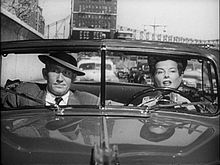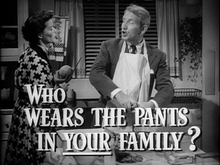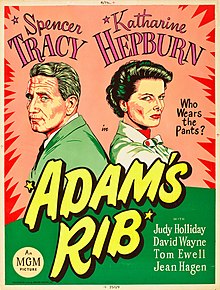
Ruth Gordon Jones was an American actress, screenwriter, and playwright. She began her career performing on Broadway at age 19. Known for her nasal voice and distinctive personality, Gordon gained international recognition and critical acclaim for film roles that continued into her 70s and 80s. Her later work included performances in Rosemary's Baby (1968), What Ever Happened to Aunt Alice? (1969), Where's Poppa? (1970), Harold and Maude (1971), Every Which Way But Loose (1978), Any Which Way You Can (1980), and My Bodyguard (1980).

Katharine Houghton Hepburn was an American actress whose career as a Hollywood leading lady spanned six decades. She was known for her headstrong independence, spirited personality, and outspokenness, cultivating a screen persona that matched this public image, and regularly playing strong-willed, sophisticated women. She worked in a varied range of genres, from screwball comedy to literary drama, and earned her various accolades, including four Academy Awards for Best Actress—a record for any performer.

Spencer Bonaventure Tracy was an American actor. He was known for his natural performing style and versatility. One of the major stars of Hollywood's Golden Age, Tracy was the first actor to win two consecutive Academy Awards for Best Actor, from nine nominations. During his career, he appeared in 75 films and developed a reputation among his peers as one of the screen's greatest actors. In 1999, the American Film Institute ranked Tracy as the 9th greatest male star of Classic Hollywood Cinema.

Ninotchka is a 1939 American romantic comedy film made for Metro-Goldwyn-Mayer by producer and director Ernst Lubitsch and starring Greta Garbo and Melvyn Douglas. It was written by Billy Wilder, Charles Brackett, and Walter Reisch, based on a story by Melchior Lengyel. Ninotchka is Greta Garbo's first full comedy, and her penultimate film; she received her third and final Academy Award nomination for Best Actress. In 1990, Ninotchka was selected for preservation in the United States National Film Registry by the Library of Congress as being "culturally, historically, or aesthetically significant". In 2011, Time also included the film on the magazine's list of "All-Time 100 Movies".
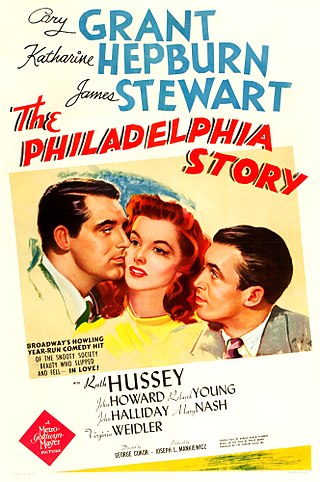
The Philadelphia Story is a 1940 American romantic comedy film starring Cary Grant, Katharine Hepburn, James Stewart and Ruth Hussey. Directed by George Cukor, the film is based on the 1939 Broadway play of the same name by Philip Barry about a socialite whose wedding plans are complicated by the simultaneous arrival of her ex-husband and a tabloid magazine journalist. The socialite, played by Hepburn in both productions, was inspired by Helen Hope Montgomery Scott (1904–1995), a Philadelphia heiress who had married Barry's friend.

Woman of the Year is a 1942 American romantic comedy-drama film directed by George Stevens and starring Spencer Tracy and Katharine Hepburn. The film was written by Ring Lardner Jr. and Michael Kanin, and produced by Joseph L. Mankiewicz.
Born Yesterday is a play written by Garson Kanin which premiered on Broadway in 1946, starring Judy Holliday as Billie Dawn. The play was adapted into a successful 1950 film of the same name.

Father of the Bride is a 1950 American romantic comedy film directed by Vincente Minnelli from a screenplay by Frances Goodrich and Albert Hackett, based on the 1949 novel of the same name by Edward Streeter. The film stars Spencer Tracy, Joan Bennett, and Elizabeth Taylor, and follows a man trying to cope with preparations for his daughter's wedding. Father of the Bride was nominated for Academy Awards for Best Picture, Best Writing, Screenplay, and Best Actor in a Leading Role.

Adolph Green was an American lyricist and playwright who, with long-time collaborator Betty Comden, penned the screenplays and songs for musicals on Broadway and in Hollywood. Although they were not a romantic couple, they shared a unique comic genius and sophisticated wit that enabled them to forge a six-decade-long partnership. They received numerous accolades including four Tony Awards and nominations for two Academy Awards and a Grammy Award. Green was inducted into the Songwriters Hall of Fame in 1980 and American Theatre Hall of Fame in 1981. Comden and Green received the Kennedy Center Honor in 1991.

Raymond Hart Massey was a Canadian actor, known for his commanding, stage-trained voice. For his lead role in Abe Lincoln in Illinois (1940), Massey was nominated for the Academy Award for Best Actor. He reprised his role as Lincoln on television and in How the West Was Won (1962). Among his other well-known roles were Dr. Gillespie in the NBC television series Dr. Kildare (1961–1966), John Brown in Santa Fe Trail (1940) and Seven Angry Men (1955), Abraham Farlan in A Matter of Life and Death (1946), and Jonathan Brewster in Arsenic and Old Lace (1944).

A Double Life is a 1947 American film noir which tells the story of an actor whose mind becomes affected by the character he portrays. It stars Ronald Colman and Signe Hasso. It is directed by George Cukor, with screenplay by Ruth Gordon and Garson Kanin. Ronald Colman won the Academy Award for Best Actor for his performance in this film.

Judy Holliday was an American actress, comedian and singer.

Garson Kanin was an American writer and director of plays and films.
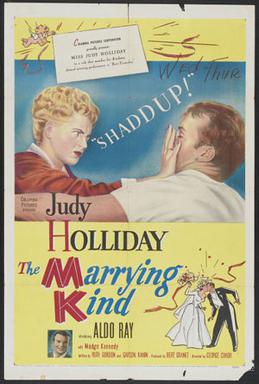
The Marrying Kind is a 1952 American comedy drama film directed by George Cukor and starring Judy Holliday and Aldo Ray. Other cast members include John Alexander, Charles Bronson, Peggy Cass, Barry Curtis, Tom Farrell, Frank Ferguson, Ruth Gordon, Gordon Jones, Madge Kennedy, Nancy Kulp, Mickey Shaughnessy, and Joan Shawlee.
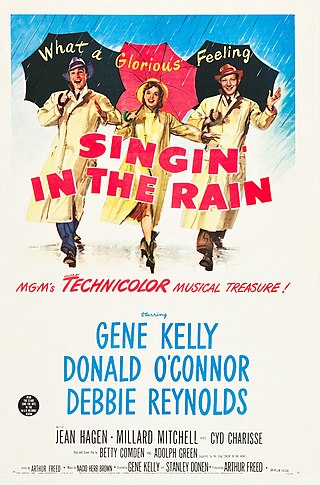
Singin' in the Rain is a 1952 American musical romantic comedy film directed and choreographed by Gene Kelly and Stanley Donen, starring Kelly, Donald O'Connor, and Debbie Reynolds and featuring Jean Hagen, Millard Mitchell and Cyd Charisse. It offers a lighthearted depiction of Hollywood in the late 1920s, with the three stars portraying performers caught up in the transition from silent films to "talkies".

Born Yesterday is a 1950 American comedy-drama film directed by George Cukor, based on the 1946 stage play of the same name by Garson Kanin. The screenplay was credited to Albert Mannheimer. According to Kanin's autobiography, Cukor did not like Mannheimer's work, believing it lacked much of the play's value, so he approached Kanin about adapting a screenplay from his own play. Because of legal entanglements, Kanin did not receive screen credit.

Pat and Mike is a 1952 American romantic comedy film starring Spencer Tracy and Katharine Hepburn. The movie was written by Ruth Gordon and Garson Kanin, and directed by George Cukor. Cukor directed The Philadelphia Story (1940) with Hepburn, and Cukor, Gordon and Kanin teamed with Hepburn and Tracy again for Adam's Rib (1949). Gordon and Kanin were nominated for the 1952 Academy Award for Best Original Screenplay for their work on Pat and Mike.
The comedy of remarriage is a subgenre of American comedy films of the 1930s and 1940s. At the time, the Production Code, also known as the Hays Code, banned any explicit references to or attempts to justify adultery and illicit sex. The comedy of remarriage with the same spouse enabled filmmakers to evade this provision of the Code. The protagonists divorced, flirted, or even had relationships, with strangers without risking the wrath of censorship, and then got back together.

Fay Kanin was an American screenwriter, playwright and producer. Kanin was president of the Academy of Motion Picture Arts and Sciences from 1979 to 1983.
Michael Kanin was an American director, producer, playwright and screenwriter who shared an Academy Award with Ring Lardner Jr. for writing the Katharine Hepburn-Spencer Tracy film comedy Woman of the Year (1942).

